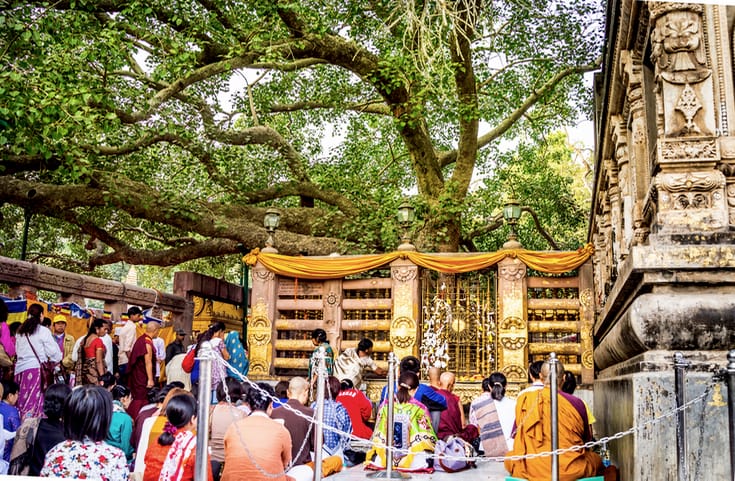This should be a no-brainer, but some travelers don't take sufficient account of the fact that behavior that would be considered unremarkable at home may cause offense in various different cultures abroad, especially in Asia, Africa, and the Middle East. Here are several examples, but this post is far from exhaustive, so do your own research depending on where you are traveling, and your experience will be all the more pleasant and rewarding because of it.

Respect for the Buddha in Asia
When visiting Buddhist temples in countries such as Thailand, Cambodia, Vietnam, Sri Lanka, and Burma, remove your hat and shoes and make sure your cover your legs and shoulders are covered. Never touch or sit/climb on a Buddha statue, and it's best to ask an attendant if it’s OK to take a photo before doing so. Also, having a visible tattoo of him degrades him, so cover it upThere are other customs such as not pointing and not eating in a temple too, but just use your common sense and be respectful.
Beliefs Regarding the Body
In some Asian countries in particular, touching the head or passing items over someone’s head is taboo, as the head is sacred. It’s also common in Asia to take off your shoes when entering a home or business, and it may apall hosts if you don’t. In India, the Middle East, Thailand, Japan, Indonesia, Vietnam, as well as some European countries such as Germany and Finland, you will be expected to remove your shoes before entering a home. If you’re unsure, just ask your host. Following on from that, feet don’t belong on the furniture. Also don’t point your feet at others in some Southeast Asian countries, it’s offensive.
For women, entering temples is forbidden when menstruating. This Hindu belief originated from a desire to give women rest while her body was doing extra work. If there’s a sign on the temple saying you cannot enter if you’re menstruating, respect that.
In Japan, blowing your nose in public is frowned upon - and if you really must, be as quiet and discreet about it as possible. Yet while a burp is something to avoid in public in Western cultures, in some countries it’s interpreted as a compliment to the chef.
Many Hindu, Muslim and Buddhist countries tend to have modest dress codes. While you will be required to cover up in temples and mosques, it is respectful to cover up in general. It’s surprising that sometimes wearing long loose pants and a long-sleeved cotton top can be cooler than shorts and a singlet- they keep the sun off, too. In some more traditional Islamic countries, women may be required to don a headscarf. This doesn’t have to be a full Muslim headscarf or niqab—a loosely draped scarf will suffice.
Food
Don’t take chewing gum into Singapore, you can be fined up to $3000.
There are 19 countries that have a total or partial ban on alcohol. Some such as Pakistan or Bahrain may allow drinking for tourists in some establishments, but places like Kuwait, Saudi Arabia and Bhutan have a total ban in place. In UAE, drinking is allowed and easily found, but public drunkenness is not advised.
Never stick your chopsticks upright into a bowl of rice. It’s very impolite and has implications to do with death.
During Ramadan in Saudi Arabia, it’s illegal to eat or drink in public during daylight. Save your snacks for at home.
In China, you should always leave a little bit of food on your plate when you’ve finished, as it shows you’ve had enough to eat and acknowledges your host’s generosity.
In Middle Eastern countries as well as Italy and Greece, the ‘thumbs up’ sign is an insult, while In Brazil, Turkey and Venezuela, the ‘A-OK’ gesture is offensive. In Greece, facing your palm at someone with all five fingers outstretched is known as the moutza, and is insulting – so if you need to gesture "five", do it pointing your palm at yourself.
Avoid beckoning someone over with your finger in Singapore, Japan and the Philippines, it’s rude or signals death, depending on the country. Crossing fingers in Vietnam symbolises a part of the female anatomy, so avoid using it there.
In India, Sri Lanka, Africa and the Middle East, it’s common that the left hand is considered unclean as it’s what you use to clean yourself in the bathroom. Therefore, locals tend to eat one handed with the right hand.
What if You Do Something Wrong?
If you’ve offended someone, don’t try to justify yourself; simply apologise immediately. You are in their country and should accommodate their customs. Don’t feel guilty or upset for not knowing but equip yourself with this knowledge to ensure it doesn’t happen again. Most people are forgiving and do understand you may not know, but always research your destination before arriving so you can avoid accidentally offending someone and making yourself look foolish or rude.
A Couple of Other Helpful Tips
If you are taking medication into a country, check beforehand that it’s allowed. Some countries have very strict drug laws and what’s available over the counter at home may land you in jail.
Make sure you are covered with good travel insurance. For more information or an online quote, visit AMI NZ



Comments